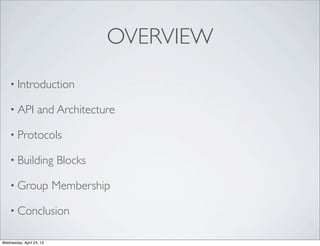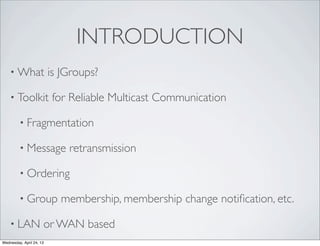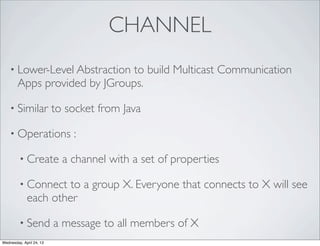Jgroups - Toolkit for Reliable Multicast Communication
- 1. JGROUPS AToolkit for Reliable Multicast Communication Wednesday, April 24, 13
- 2. ŌĆó Introduction ŌĆó API and Architecture ŌĆó Protocols ŌĆó Building Blocks ŌĆó Group Membership ŌĆó Conclusion OVERVIEW Wednesday, April 24, 13
- 3. INTRODUCTION ŌĆó What is JGroups? ŌĆó Toolkit for Reliable Multicast Communication ŌĆó Fragmentation ŌĆó Message retransmission ŌĆó Ordering ŌĆó Group membership, membership change noti’¼ücation, etc. ŌĆó LAN or WAN based Wednesday, April 24, 13
- 4. INTRODUCTION ŌĆó Where JGroups ’¼üts in? Unreliable Reliable Unicast UDP TCP Multicast IP Multicast JGroups Wednesday, April 24, 13
- 5. API & ARCHITECTURE Wednesday, April 24, 13
- 6. CHANNEL ŌĆó Lower-Level Abstraction to build Multicast Communication Apps provided by JGroups. ŌĆó Similar to socket from Java ŌĆó Operations : ŌĆó Create a channel with a set of properties ŌĆó Connect to a group X. Everyone that connects to X will see each other ŌĆó Send a message to all members of X Wednesday, April 24, 13
- 7. BUILDING BLOCKS ŌĆó Group communication pattern ŌĆó Layered on top of channels ŌĆó More sophisticated APIs ŌĆó Applications communicate directly with the building block, rather than the channel. ŌĆó Composed with many basic multicast function Wednesday, April 24, 13
- 8. BUILDING BLOCKS Wednesday, April 24, 13
- 9. FLEXIBLE PROTOCOL STACK ŌĆó The most powerful feature of JGroups!! ŌĆó Contains a number of protocol layers in a bidirectional list. ŌĆó A message sent by Channel is simply passed to the protocol stack which in turn forwards it to the top most layer. ŌĆó Available Protocol : ŌĆó Transport: UDP,TCP,TCP_NIO,TUNNEL, JMS, LOOPBACK ŌĆó Discovery: PING,TCPPING,TCPGOSSIP, UDPPING ŌĆó Reliable delivery & FIFO: NAKACK, SMACK ŌĆó Group membership, Failure Detector, Security, Fragmentation,Virtual Synchrony, Ordering, etc. Wednesday, April 24, 13
- 10. GROUP MEMBERSHIP SERVICE ŌĆó Task : ŌĆó Maintain a list of members ŌĆó Notify members when a new member joins, or an existing member leaves (or crashes) ŌĆó Each member has the same ordered list ŌĆó List can be retrieved by Channel.getView() ŌĆó First (= oldest) member is coordinator ŌĆó If coord crashes, 2nd oldest takes over Wednesday, April 24, 13
- 11. VIRTUAL SYNCHRONY ŌĆó AView is a list of members (A,B,C,D) ŌĆó When members join/leave, a new view will be installed (A,C,D) ŌĆó Every healthy member receives the same set of messages between subsequent views ŌĆó Messages sent inV1 are received inV1 ŌĆó All msgs by sender received in same order Wednesday, April 24, 13
- 12. VIRTUAL SYNCHRONY ŌĆó The FLUSH protocol ensures that all members have received all msgs inV1 before installingV2 ŌĆó New members wonŌĆÖt receive messages from previous views ŌĆó Member that left wonŌĆÖt receive msgs Wednesday, April 24, 13
- 13. FAILURE DETECTION ŌĆó Failure detection protocol sends up SUSPECT event ŌĆó VERIFY_SUSPECT double checks ŌĆó GMS multicasts new view (not containing crashed member) ŌĆó If member resurfaces, it will be shunned ŌĆó Has to leave and rejoin group Wednesday, April 24, 13
- 14. FAILURE DETECTION ŌĆó Task : ŌĆó Detect if a member has crashed and send SUSPECT event up the stack (to be handled by GMS) ŌĆó Logical ring over membership ŌĆó Each member pings its neighbor to the right Wednesday, April 24, 13
- 15. FAILURE DETECTION Wednesday, April 24, 13
- 16. CONCLUSION ŌĆó Jgroups merupakan toolkit yang bisa dipakai saat akan membangun suatu aplikasi yang membutuhkan aspek reliability dalam komunikasi grup. ŌĆó Jgroups sangat modular dan mudah untuk dimodi’¼ükasi sesuai dengan kebutuhan aplikasi ŌĆó Pengembang aplikasi bisa lebih fokus terhadap persoalan apa yang mau dipecahkan oleh aplikasinya. Wednesday, April 24, 13
- 17. REFERENCE ŌĆó JavaGroups - Group Communication Patterns in Java, Bela Ban. 1998 ŌĆó Design and Implementation of a Reliable Group CommunicationToolkit for Java, Bela Ban, - ŌĆó JgroupTutorial and ProgrammerŌĆÖs Manual,Albert M. dkk. 2002. ŌĆó Reliable and Secure Distributed Programming 2nd Ed, C. Cachin dkk. 2011. ŌĆó http://www.jgroups.org ŌĆó https://github.com/belaban/JGroups Wednesday, April 24, 13
- 18. Thank you & Question? Wednesday, April 24, 13


















